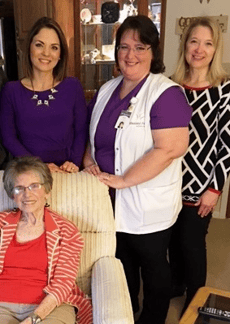As a health and wellness organization, we spend a lot of time talking about the importance of living well. When it comes to dying well, that’s a conversation that’s much less likely to be initiated.
 At WesleyLife, we believe anytime is the appropriate time to start a conversation about living with – or helping a loved one live with – a life-altering illness, and about the fact that compassionate care can help ensure quality of life.
At WesleyLife, we believe anytime is the appropriate time to start a conversation about living with – or helping a loved one live with – a life-altering illness, and about the fact that compassionate care can help ensure quality of life.
WesleyLife is a recognized and trusted name in services for older adults for 70 years, and we offer hospice care as a component of our broad network of home and community services. It’s our hope that if you’re wondering if you or a loved one could benefit from hospice care, the information below, compiled with assistance from the American Hospice Foundation, might help you start a discussion with your healthcare provider.
Myth #1: Hospice is appropriate only when a patient is at death’s door.
Truth: The hospice conversation should begin before a patient is in his or her last days; ideally, it should take place when individuals are still healthy. Virtually anyone with a life-limiting illness can qualify for hospice care, enabling a patient to live life in comfort for the days, weeks, months or longer that remain in his or her life. It’s not unheard of for a patient’s condition to improve and for him or her to “graduate” from hospice care. We believe life can and should be lived fully, no matter how much time remains.
Myth #2: Families are discouraged from involvement in a loved one’s hospice care.
Truth: On the contrary, hospice care can benefit family members nearly as much as it can benefit patients. One of the gifts of hospice is its capacity to help families realize how much can be shared at the end of life through personal and spiritual connection. As part of a family-centered concept of care, hospice focuses almost as much on supporting a patient’s family members as on caring for the patient. It’s not unusual for family members to look back upon the hospice experience with gratitude.
Myth #3: Hospice is a place.
Truth: WesleyLife hospice care takes place wherever the need exists, usually in the patient’s home.
Myth #4: Hospice is only for patients with cancer.
Truth: More than one-half of hospice patients nationwide have diagnoses other than cancer. Hospice commonly serves patients who are living with chronic diseases such as emphysema, Alzheimer’s disease, or cardiovascular and neuromuscular illnesses.
Myth #5: Hospice is for people who don’t need a high level of care.
Truth: WesleyLife Hospice is Medicare-certified, employing experienced medical and nursing personnel with skills in symptom control. We offer palliative care, using advanced technologies to prevent or alleviate distressing symptoms.
Myth #6: Hospice care is expensive.
Truth: Most hospice patients age 65 or older are entitled to the Medicare Hospice Benefit, which covers virtually all hospice services and requires the patient to pay little in out-of-pocket costs. This means there are no financial burdens incurred by the family – a situation that can contrast sharply with major expenses that can be incurred to manage a life-limiting illness when hospice is not used.
Again – WesleyLife Hospice is available to assist with any questions, concerns or needs around hospice care, and we’re ready to help wherever you or a loved one calls home. Contact us today at (515) 978-2777.





